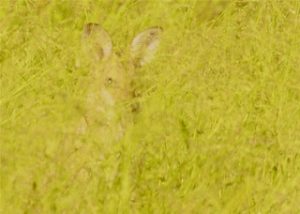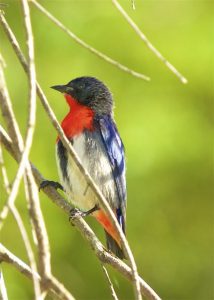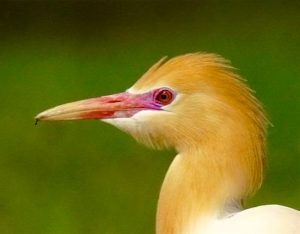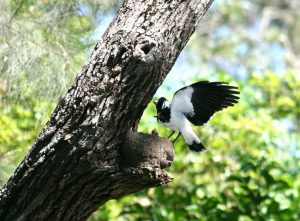Remember the “Where’s Wally” pictures from back in the eighties?
Well, Ed Frazer has his own take on the the theme!
Thank you Ed, for sharing with us this photo of a beautifully camouflaged wallaby lurking in the grass ….
 © Ed Frazer
© Ed Frazer

by mccgadmin
Remember the “Where’s Wally” pictures from back in the eighties?
Well, Ed Frazer has his own take on the the theme!
Thank you Ed, for sharing with us this photo of a beautifully camouflaged wallaby lurking in the grass ….
 © Ed Frazer
© Ed Frazer
by mccgadmin
There is a lot to learn about mistletoe!
For instance, it is a parastic plant, known as a hemiparasite. It hosts mainly on Eucalypts and Acacias, from which it extracts water and essential minerals.
Mistletoebirds love mistletoe nectar and they are largely responsible for disseminating its seeds.
Many other birds in our catchment also love mistletoe nectar and the plant’s dense growth habit, which provides plenty of safe havens to call home.
Head to Jim Butler’s April issue of Feather Fascination for more facts – this is a very interesting read!
 © Ed Frazer
© Ed Frazer
by mccgadmin
Need some good news and inspiration amidst all this uncertainty and sadness?
Here are some uplifting words and suggestions from Birdlife Australia’s CEO, Paul Sullivan:
I am so grateful that no matter where you live, you can still see birds and take comfort from them.
Please visit our new Birding at Home page to find out how you and your household can continue to enjoy the beauty of our feathered friends.
You’ll find activities to occupy kids while our movements are restricted, links to our Autumn Birds in Backyards survey and Bird Finder, and information on how you can act to protect birds forever.
To help everyone who is now Birding at Home, we are also kicking off a regular live series on Facebook where our bird experts will be taking questions and talking about what we love best – birds.
The first event will be Backyard Birding for Beginners, hosted by Sean Dooley at midday on Thursday April 9th. Even if you are an expert birder, I encourage you to join in for a chat – and please spread the word to all the bird and nature lovers in your life. Sean is also keen to answer your backyard birding questions – so if you’ve got a query, get involved!

Close-up of a local Cattle Egret – © Ed Frazer
by mccgadmin
The recent social distancing rules necessarily imposed upon us don’t necessarily mean we can no longer connect with nature.
Our Chairman, Jim Pope, offers some great advice here about reducing the spread of weeds at home while we are nationally reducing the spread of Covid-19.
And our colleagues at the Cubberla-Witton Catchments Network (CWCN) have extended MCCG members an invitation to join them in assessing the diversity of our local species via their QuestaGame Challenge.
Assessing what you have on site is a wonderful way of staying connected, a wonderful way of finding out whether our rehabilitation work is yielding results and a wonderful way of figuring out what fauna, flora and fungi we have in Brisbane’s beautiful west.
Everything uploaded to QuestaGame will end up with the Atlas of Living Australia, so why not become a Citizen Scientist?
Download the free app onto your smartphone, ipad or tablet via Google Play or iTunes. Details on how to play can be found on https://questagame.com/
Once you’re set up, join the Cubberla-Witton Catchments Network Clan. The password to join is ‘possum’.
If you have questions or need some help setting it all up, send Jutta Godwin an email: [email protected]
Now is an ideal time to GET INVOLVED in SOMETHING DIFFERENT about SOMETHING TO LOVE and HAVE SOME FUN!!!
Our thanks to Jutta (CWCN’s Education Officer) and to CWCN for their invitation …. love your work!
by mccgadmin
We, as a nation and community, are facing the greatest challenge of our times.
In the interests of the safety of our members and volunteers and halting the progress of Covid-19, we have taken the decision to temporarily halt all activities.
Habitat Brisbane has advised that working bees on public land must be cancelled until further notice. People may of course still work on their own properties, but only as a family/household group that does not involve neighbours.
Our colleagues at THECA and the Cubberla-Witton Catchment Network (CWCN) have cancelled all activities, and the Brookfield Show, scheduled for 15 May has also been cancelled.
The MCCG appreciates your support of this decision and we wish you the best of health until the situation is resolved and our activities can resume safely.
by mccgadmin
If you love music and birdlife, check out this short You-Tube video!
It has some lovely footage which has been set to a cleverly crafted symphonic mix of Mozart and birdsong!
Quite delightful and guaranteed to lift your spirits!
Grey Butcher Bird – a bird with a magical song – © Ed Frazer
by mccgadmin
The Queensland Government has announced plans for legislation to phase out certain plastic products.
In the first stage of the phase-out, plastic straws, stirrers, cutlery and plates would not be allowed to be supplied to the public from July 2021.
Wildlife Queensland is calling for members of the public to back this legislation!
The government statement provides four choices to eliminate these plastic products:
Wildlife Queensland’s position is simply this : BAN THESE PRODUCTS FROM USE!
For more information and to make a submission to support the ban of single use plastics, please visit the Wildlife Queensland website.
Submissions must be lodged by 15 April 2020. You submission counts!
by mccgadmin
It is likely that we are facing an extended period of home isolation, which will be challenging for all of us.
I suggest we all try to get some exercise by taking frequent walks around the parklands, individually or in family groups, always being mindful of social distancing.
The conditions are currently excellent for outdoor exercise, but also for the growth of weeds!
I have been taking gloves and a pair of secateurs or a folding pruning saw with me on these excursions and cutting back some of the more vigorous weed vines. Balloon vine, glycine and Madeira vine are particularly rampant at the moment, with the latter now in flower. Madeira vine rarely – if ever – produces seed here. It propagates from tubers produced in leaf axils . We always make sure where Madeira vine occurs to collect any stem material or tubers in plastic bags for disposal. Underground tubers should be lifted with care and taken away in bags too.
So take a walk and check for weeds! This way we can all contribute to environmental protection while staying fit and healthy!
by mccgadmin
The MCCG website has recently moved to a new platform.
We are hoping the migration is seamless and that you do not notice any changes.
If you notice anything unexpected or any errors on the site, we’d be grateful if you could send an email to: [email protected].
We thank you for visiting our website and hope you find the content interesting and useful!
by mccgadmin
We all know that birds love trees.
But in fact they need a lot more than trees in order to secure adequate food, shelter and safe havens for breeding.
Open Jim Butler’s March issue of Feather Fascination in which he shares a story that features the prolonged creation of inappropriate bird habitat.
 Magpie Lark feed its young in a tree – photo courtesy Malcolm Frost
Magpie Lark feed its young in a tree – photo courtesy Malcolm Frost
